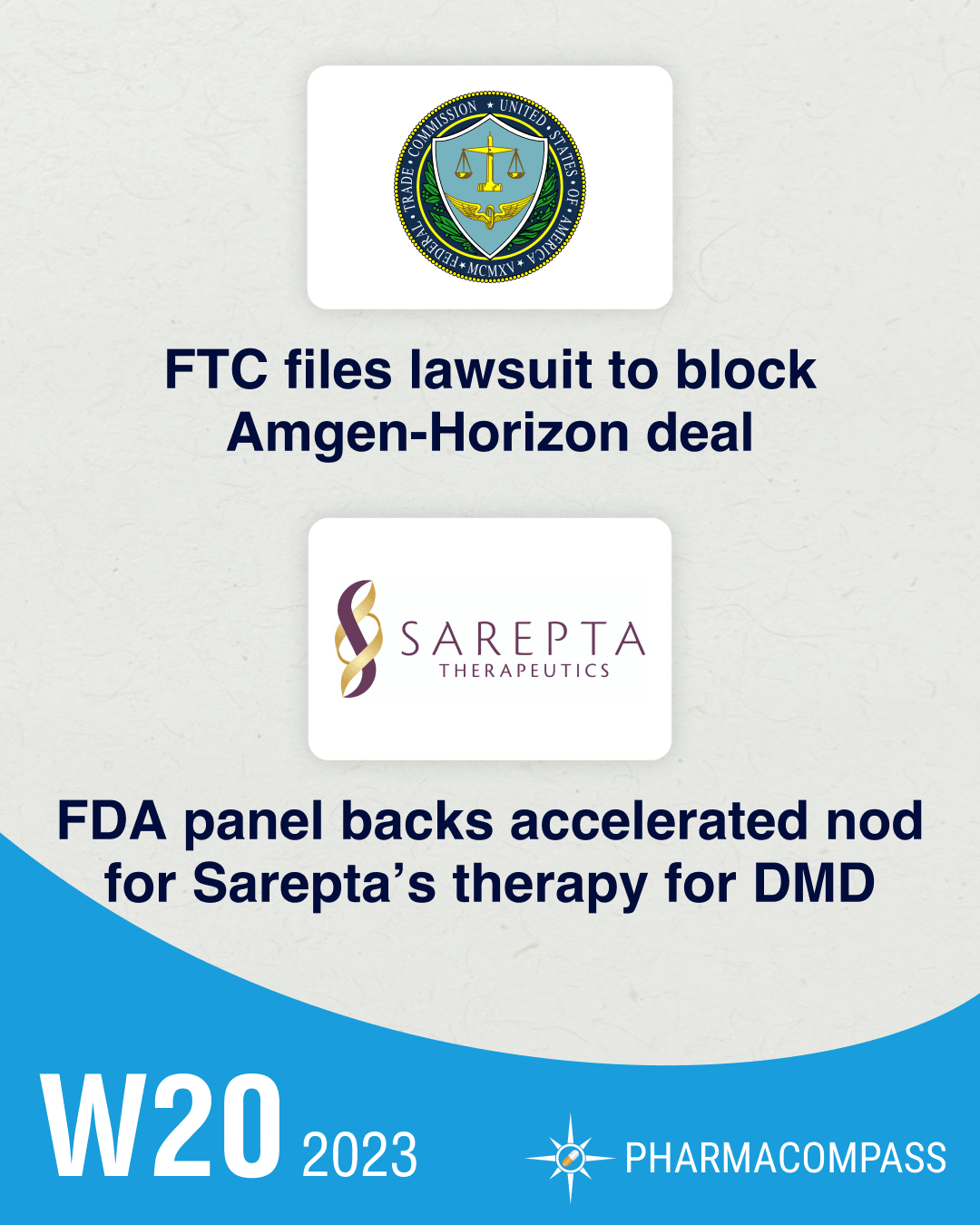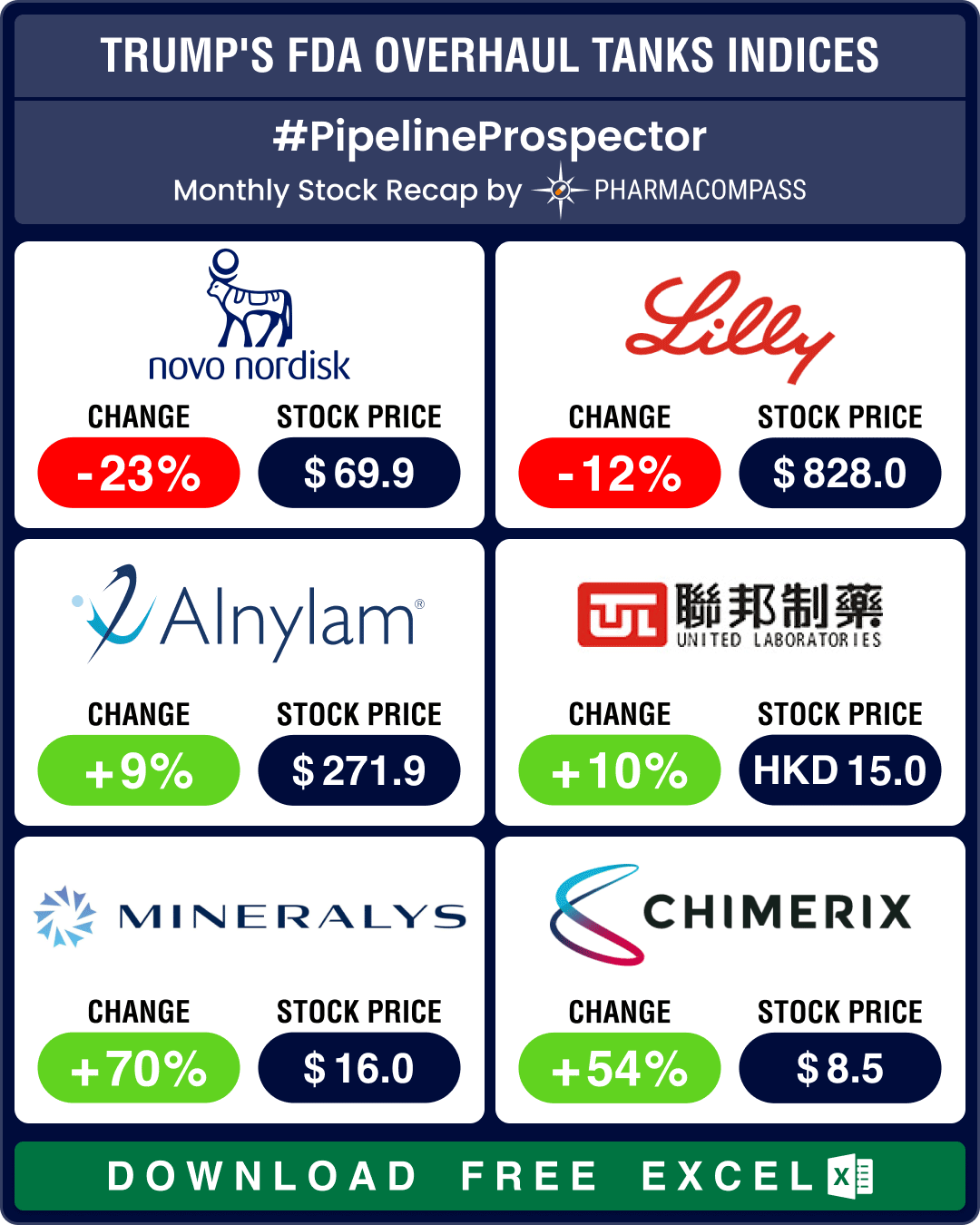
By PharmaCompass
2023-05-18
Impressions: 1,163 (Article) || 1 (Video)
The US Federal Trade Commission (FTC) has filed a lawsuit to stop Amgen’s US$ 27.8 billion takeover of Horizon Therapeutics over monopoly concerns.
A panel of external experts to the US Food and Drug Administration (FDA) have voted 8-6 to recommend accelerated approval of Sarepta Therapeutics’ first-of-its-kind gene therapy for Duchenne muscular dystrophy (DMD) – a disease that causes progressive muscle failure.
Sanofi and AstraZeneca have said results from a late-stage study show their antibody drug – Beyfortus (nirsevimab) – reduces hospitalizations by 83 percent in infants. Meanwhile, safety data for Pfizer’s experimental RSV vaccine in pregnant women has shown favorable results.
FDA has rejected ImmunityBio’s combination therapy for a type of bladder cancer. The agency has also expressed concerns over Intercept Pharmaceuticals’ experimental oral tablets for nonalcoholic steatohepatitis (NASH).
PTC Therapeutics’ treatment for a rare disease, known as phenylketonuria, has met the primary endpoint in a phase 3 trial. And in a late-stage trial, a combination of AstraZeneca’s cancer drug Tagrisso (osimertinib) and chemotherapy has shown meaningful improvement in patients with locally advanced or metastatic epidermal growth factor receptor-mutated (EGFRm) non-small cell lung cancer.
Monopoly concerns push FTC to file lawsuit to block Amgen-Horizon deal
The US Federal Trade Commission (FTC) has filed a lawsuit to block Amgen’s US$ 27.8 billion takeover of Horizon Therapeutics, which was announced last December. The three members of the agency unanimously voted against the deal due to concerns that Amgen could offer attractive rebates on its existing successful drugs, such as Enbrel and Otezla, to pressurize insurance companies and pharmacy benefit managers (PBMs) into offering favorable terms for Horizon’s two key products – thyroid eye disease treatment Tepezza and gout med Krystexxa.
This is the first time the antitrust agency has shifted its focus beyond product overlaps to companies’ past behaviors regarding drug pricing. Amgen expressed disappointment with the FTC decision, stating it had demonstrated that the acquisition would not present any legitimate competitive concerns.
News of the lawsuit had a negative impact on stock prices, with Horizon’s shares dropping by 14 percent. According to a Reuters report, investors are now assessing the fallout of the FTC lawsuit with some fearing a spillover to other big pharma deals.
Meanwhile, Pfizer and Seagen have submitted the necessary paperwork for their planned US$ 43 billion merger to the FTC and the Department of Justice.
FDA panel backs accelerated nod for use of Sarepta’s gene therapy in DMD
A panel of external experts to the FDA voted 8-6 to recommend accelerated approval of Sarepta Therapeutics’ first-of-its-kind gene therapy for Duchenne muscular dystrophy (DMD) – a disease that causes progressive muscle failure.
Last week, FDA had expressed skepticism over the therapy’s effectiveness, citing lack of compelling evidence. A decision by the FDA is expected by the end of this month. Sarepta is currently conducting a late-stage trial to confirm the therapy’s actual benefit to patients.
Astellas’ drug for hot flashes bags FDA nod: FDA has approved Japanese drugmaker Astellas Pharma’s oral drug Veozah (fezolinetant) for the treatment of moderate to severe vasomotor symptoms (VMS), or hot flashes associated with menopause. The drug will cost US$ 550 for a month’s supply.
Meanwhile, UK’s regulatory agency has recommended Gilead’s bulevirtide for the treatment of adults with hepatitis delta virus (HDV) and compensated liver disease, the most aggressive and life-threatening form of hepatitis.
Astra’s drug achieves success in late-stage lung cancer trial: In a late-stage trial, a combination of AstraZeneca’s cancer drug Tagrisso (osimertinib) and chemotherapy has shown meaningful improvement in progression-free survival of patients with locally advanced or metastatic epidermal growth factor receptor-mutated (EGFRm) non-small cell lung cancer.
Sanofi, Astra’s RSV drug reduces hospitalizations in infants by 83 percent in trial
Weeks after FDA approved GSK’s Arexvy as the first vaccine for protection against respiratory syncytial virus (RSV) in people aged 60 and older, Sanofi and AstraZeneca have unveiled results from a late-stage study showing their antibody drug – Beyfortus (nirsevimab) – reduced hospitalizations by 83 percent in infants. The drug received authorization in both Europe and the UK last November as the first preventive treatment for RSV in newborns and infants.
Meanwhile, FDA staff reviewers said safety data for Pfizer’s experimental RSV vaccine in pregnant women has shown favorable results. In April, Pfizer had said its vaccine is 82 percent effective in preventing severe infections in infants when administered to expectant mothers during the later stages of pregnancy.
PTC’s rare disease drug scores win in phase 3 trial; Allergan’s Skinvive bags FDA nod
PTC Therapeutics’ treatment for a rare disease, known as phenylketonuria (PKU), has met the primary endpoint in a phase 3 trial. This disease can cause a toxic build-up of an amino acid.
The company said the drug, sepiapterin, reduced blood levels of amino acid phenylalanine by an average of 63 percent in the primary analysis population. In a subset of patients with classic PKU — the most severe form of the disease — the average reduction was 69 percent. The trial has enrolled 156 adults and children. Sepiapterin was generally well tolerated with no serious adverse events, the company said in a statement.
Meanwhile, FDA has approved Allergan Aesthetics’ Skinvive by Juvederm to improve skin smoothness of the cheeks in adults over the age of 21. This is the first and only hyaluronic acid intradermal microdroplet injection for skin smoothness available in the US.
FDA reviewers flag serious safety risks for Intercept’s NASH tablets
FDA staff reviewers have expressed serious concerns over Intercept Pharmaceuticals’ experimental oral tablets for nonalcoholic steatohepatitis (NASH), a type of fatty liver disease. The reviewers said the risks of the tablets, called obeticholic acid (OCA), outweigh the benefits, and may lead to an increased risk of diabetes and liver injury. Although a 25-mg dose reduced liver scarring in a pivotal trial, it didn’t meet the primary endpoints for NASH resolution.
The agency has shared these findings ahead of an advisory committee meeting later this week. Currently, there are no approved treatments for NASH.
Rejects ImmunityBio’s combo therapy for bladder cancer: The agency has also rejected ImmunityBio’s combination therapy for a type of bladder cancer, citing deficiencies related to an inspection of a third-party contract manufacturer. The therapy, Anktiva, in combination with Bacillus Calmette-Guérin, is being developed to treat patients with BCG-unresponsive non-muscle invasive bladder cancer with carcinoma in situ with or without Ta or T1 disease.The PharmaCompass Newsletter – Sign Up, Stay Ahead
Feedback, help us to improve. Click here
Image Credit : Phisper Infographic by PharmaCompass license under CC BY 2.0
“ The article is based on the information available in public and which the author believes to be true. The author is not disseminating any information, which the author believes or knows, is confidential or in conflict with the privacy of any person. The views expressed or information supplied through this article is mere opinion and observation of the author. The author does not intend to defame, insult or, cause loss or damage to anyone, in any manner, through this article.”








